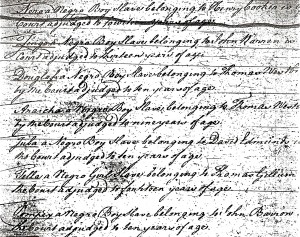The entire Court Order book collection of the Southampton County, Virginia Court from 1749 through the early 1880s has been digitalized. This includes 57,000 pages, involving approximately one million names. This information is free online at: www.wiki.familysearch.org/en/Southampton_County,_Virginia. This collection is a goldmine for African Americans tracing their ancestors who once lived in Southampton County. Many of the books that have been digitized were 300 to 700 pages. Court Order books from the 1700s to the end of the slave trade lists the names of Africans when they were first brought to the area, their ages, owner’s names, and in a few cases the ships on which they were brought over. Wills and estate settlements lists the names of slaves, descriptions and family relationships. If your ancestors came from Southampton County, Virginia, you must check out this collection. Thanks go to Southampton Circuit Court Clerk, Richard Francis, and the volunteers of the Brantley Association of America who undertook this huge project in 2009 and 2010.
Posts Tagged ‘Court Orders’
Digitalization of Southampton County Virginia Records Opens New Doors for African American Research
Sunday, April 17th, 2011Colonial Documents Reveal African Roots
Friday, July 24th, 2009Nero a Negro boy slave belonging to Henry Cooker is by the court adjudged to fourteen years of age.
Zingo a Negro boy slave belonging to John Warren by the court adjudged to thirteen years of age.
Douglas a Negro boy slave belonging to Thomas Westbrooks by the court adjudged to ten years of age.
Anarcha a Negro boy slave belonging to Thomas Westbrooks by the court adjudged to nine years of age.
Juba a Negro boy slave belonging to David Edmunds by the court adjudged to ten years of age.
Tilla a Negro girl belonging to Thomas Gillum the court adjudged to fourteen years of age.
Pompey a Negro boy slave belonging to John Barrow the court adjudged to ten years of age.
During the Colonial period, slave owners were required to pay taxes on their slaves from ages twelve to fifty years old. When Africans were brought to the colonies and it was evident that they were adults they were simply added to tax rolls called tithables. When small children and teenagers arrived from Africa and their ages were uncertain, the slave owners would have to take them into court and a judge would assign an age for the slave, which was then recorded in minute or court order books. Most of the slaves were assigned English names, although some retained their true African names. Some of the court orders also list the names of the ships the Africans arrived in and the dates of arrival. Many of these individuals can be traced in later documents such as tax records, wills, and estate settlements. These records can prove to be a genealogical goldmine for African American researchers.
